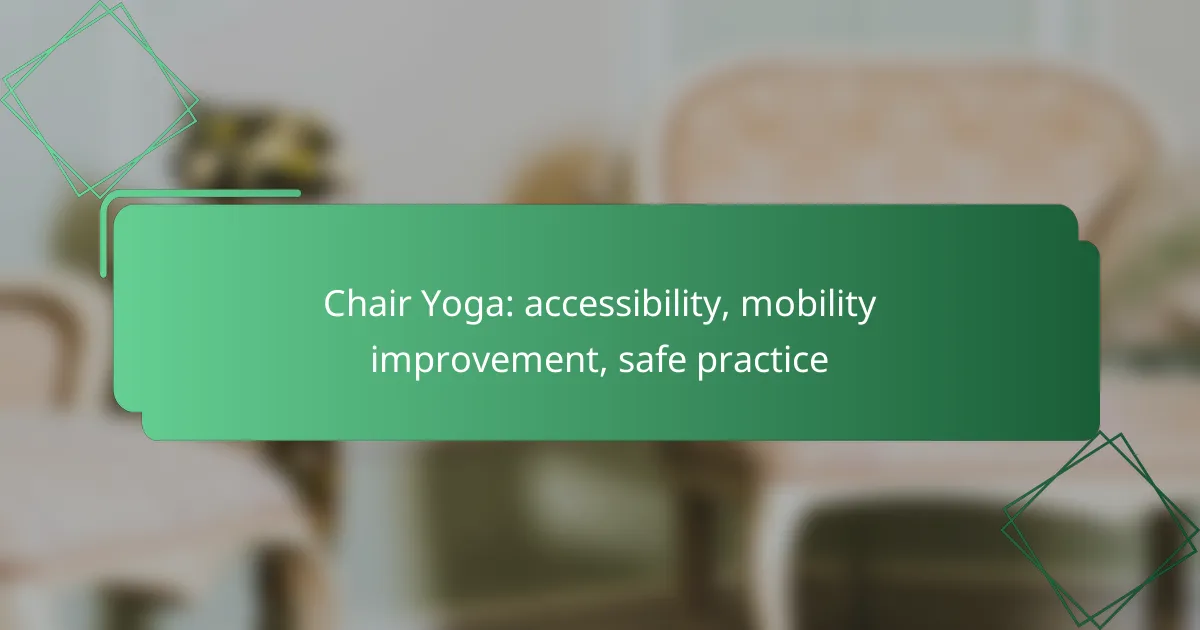Kripalu Yoga is a transformative practice that emphasizes self-discovery through mindful movement, breath awareness, and self-reflection. By fostering compassion and empathy, it creates a supportive community that encourages personal growth. Its adaptable nature ensures that individuals of all abilities can engage with the practice, promoting inclusivity and self-acceptance.

How does Kripalu Yoga promote self-discovery?
Kripalu Yoga fosters self-discovery by encouraging practitioners to explore their inner selves through mindful movement, breath awareness, and self-reflection. This approach allows individuals to connect with their emotions and thoughts, leading to greater self-awareness and personal insight.
Mindfulness practices
Mindfulness practices in Kripalu Yoga involve being fully present during each pose and breath. This heightened awareness helps individuals observe their thoughts and feelings without judgment, creating a safe space for self-exploration. Techniques such as focusing on the breath or sensations in the body can enhance this experience.
To incorporate mindfulness, practitioners can set aside a few minutes before or after their yoga session to engage in deep breathing or meditation. This practice can help clarify thoughts and emotions, promoting a deeper understanding of oneself.
Introspective techniques
Introspective techniques in Kripalu Yoga encourage self-reflection through journaling, guided visualizations, or silent contemplation. These methods allow practitioners to process their experiences and emotions, leading to insights about their personal journeys. Regularly engaging in these techniques can reveal patterns and beliefs that may need addressing.
For effective introspection, consider dedicating time each week to reflect on your yoga practice and its impact on your life. Writing down your thoughts can help solidify your discoveries and track your growth over time.
Personal growth workshops
Personal growth workshops associated with Kripalu Yoga provide structured environments for deeper self-exploration. These workshops often combine yoga practice with discussions, activities, and group sharing, fostering a sense of community and support. Participants can learn from each other’s experiences, enhancing their own self-discovery journey.
When choosing a workshop, look for those that align with your interests and goals, such as stress reduction, emotional healing, or spiritual growth. Engaging with others in this setting can amplify insights and motivate personal development.

What are the compassionate principles of Kripalu Yoga?
The compassionate principles of Kripalu Yoga focus on fostering self-awareness, empathy, and community support. These principles guide practitioners to cultivate a deeper understanding of themselves and others, promoting a nurturing environment for personal growth and connection.
Non-judgmental awareness
Non-judgmental awareness in Kripalu Yoga encourages practitioners to observe their thoughts, feelings, and bodily sensations without criticism. This practice helps individuals develop a compassionate relationship with themselves, allowing for acceptance of their current state without striving for perfection.
To cultivate non-judgmental awareness, try incorporating mindfulness techniques into your practice. For example, during a yoga session, focus on your breath and notice any distractions without labeling them as good or bad. This approach can lead to greater self-acceptance and emotional resilience.
Empathy in practice
Empathy in practice involves understanding and sharing the feelings of others, which is a core tenet of Kripalu Yoga. This principle encourages practitioners to connect with their peers, fostering a sense of compassion and support within the yoga community.
To enhance empathy, engage in active listening during group classes or discussions. Acknowledge others’ experiences and emotions, and respond with kindness. This can create a supportive atmosphere where everyone feels valued and understood.
Community support
Community support is vital in Kripalu Yoga, as it creates a safe space for individuals to explore their personal journeys together. Practicing in a group setting allows for shared experiences and collective growth, reinforcing the importance of compassion.
Participate in community events, workshops, or group classes to strengthen your connection with fellow practitioners. Sharing your experiences and supporting one another can deepen your practice and enhance the overall sense of belonging within the Kripalu Yoga community.

How can Kripalu Yoga be adapted for different needs?
Kripalu Yoga can be tailored to accommodate various physical and emotional needs, making it accessible for everyone. This adaptability allows practitioners to engage with the practice at their own pace and comfort level, fostering a more inclusive environment.
Modifications for physical limitations
Practitioners with physical limitations can benefit from specific modifications that enhance their experience. For example, using props like blocks, straps, or bolsters can provide support and stability during poses. Additionally, chair yoga is an excellent option for those who may find traditional floor poses challenging.
Instructors should encourage students to listen to their bodies and adjust poses accordingly, such as reducing the depth of a stretch or opting for gentler variations. This approach ensures that everyone can participate without risking injury.
Inclusive teaching methods
Inclusive teaching methods in Kripalu Yoga focus on creating a welcoming atmosphere for all participants. Instructors can use clear, descriptive language and demonstrate poses from multiple angles to cater to different learning styles. Offering verbal cues alongside visual demonstrations helps ensure understanding.
Encouraging open communication allows students to express their needs and preferences, fostering a supportive community. Instructors should also be trained in sensitivity and awareness to better address the diverse backgrounds and experiences of their students.
Accessible class formats
Accessible class formats can include online sessions, shorter class durations, or hybrid models that combine in-person and virtual attendance. These options help accommodate varying schedules and preferences, making it easier for individuals to participate in Kripalu Yoga.
Offering classes at different times and in various locations can also enhance accessibility. For example, community centers or local parks may provide a more inviting space for those who feel intimidated by traditional studios.

What are the benefits of practicing Kripalu Yoga in urban areas?
Practicing Kripalu Yoga in urban areas offers numerous benefits, including stress relief, community building, and access to a variety of classes. These advantages help individuals navigate the fast-paced city life while fostering personal growth and compassion.
Stress relief in city life
Urban environments can be overwhelming, leading to increased stress levels. Kripalu Yoga focuses on self-awareness and mindfulness, which can significantly reduce anxiety and promote relaxation. Regular practice helps individuals manage stress by encouraging deep breathing and gentle movement.
Incorporating Kripalu Yoga into your routine can be as simple as attending a weekly class or practicing at home. Aim for sessions that last between 30 minutes to an hour, allowing time for both physical postures and meditation to maximize stress relief.
Building local community
Participating in Kripalu Yoga classes fosters connections with like-minded individuals in your area. These classes create a supportive environment where practitioners can share their experiences and challenges, enhancing the sense of community. Many studios also host events and workshops that further strengthen these bonds.
To build a local community, consider joining group classes or attending yoga-related events. Engaging with fellow practitioners can lead to friendships and support networks that enrich your yoga journey.
Access to diverse classes
Urban areas typically offer a wide range of Kripalu Yoga classes, catering to different skill levels and preferences. This diversity allows practitioners to explore various styles, from gentle restorative sessions to more vigorous flows, ensuring that everyone can find a class that suits their needs.
When searching for classes, look for local studios or community centers that provide a schedule of offerings. Many places also offer introductory rates or drop-in options, making it easy to try out different classes without a long-term commitment.

What prerequisites should one consider before starting Kripalu Yoga?
Before starting Kripalu Yoga, it’s essential to consider your physical readiness and mental openness. These factors will help ensure a more fulfilling and effective practice, allowing you to engage deeply with the principles of self-discovery and compassion that Kripalu Yoga emphasizes.
Physical readiness
Physical readiness for Kripalu Yoga involves assessing your current fitness level and any existing health conditions. While Kripalu Yoga is adaptable for various abilities, being aware of your body’s limitations can enhance your experience and prevent injuries.
Start by evaluating your flexibility, strength, and endurance. If you’re new to yoga, consider beginning with gentle classes or introductory sessions to build a foundation. Always consult with a healthcare professional if you have specific concerns or conditions that may affect your practice.
Mental openness
Mental openness is crucial for fully embracing the principles of Kripalu Yoga. This practice encourages self-exploration and compassion, which requires a willingness to let go of preconceived notions and judgments about yourself and others.
To cultivate mental openness, approach your practice with curiosity and a non-judgmental attitude. Set intentions that focus on self-acceptance and personal growth. Engaging in mindfulness exercises outside of yoga can also enhance your ability to remain open during your sessions.










